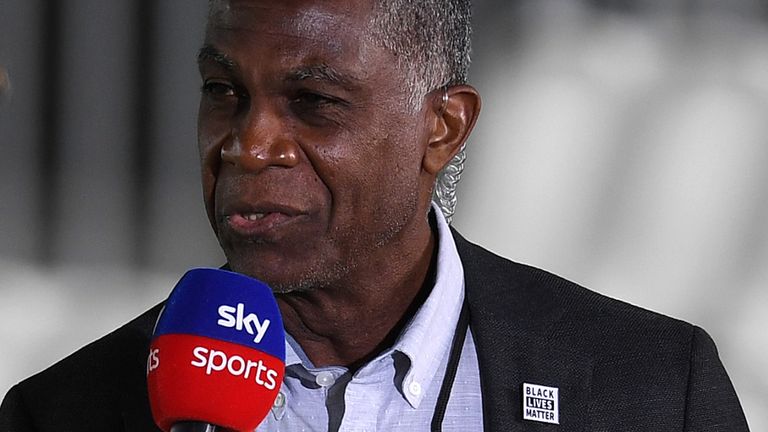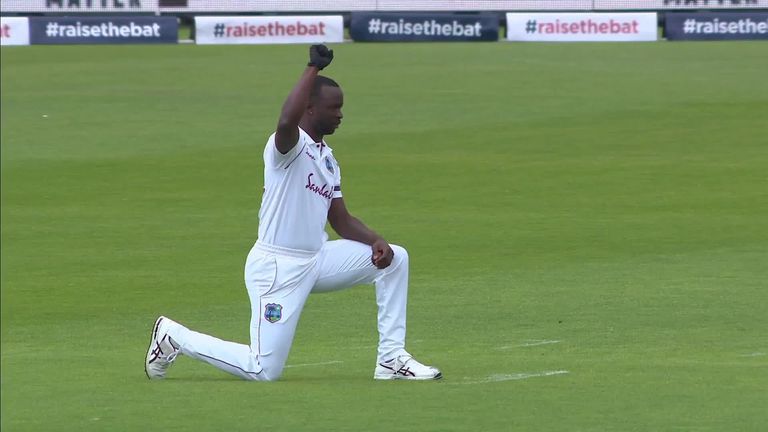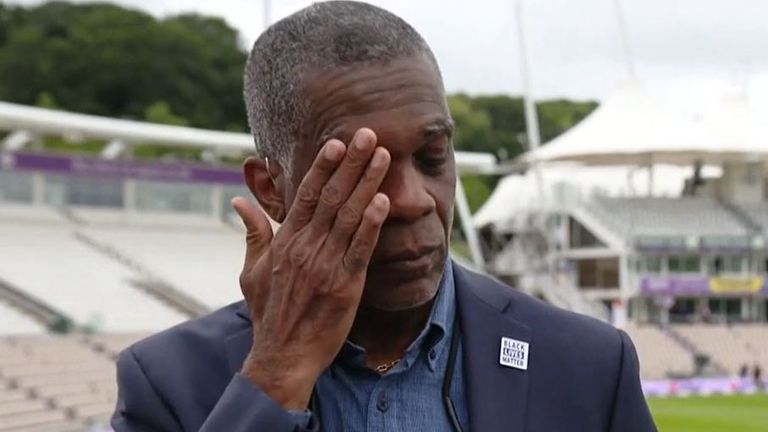Michael Holding criticises England for choosing not to take a knee in Pakistan and Australia series
West Indies legend says England and Australia offered "lame excuses" for their decision to not take a knee for their current white-ball series
Friday 11 September 2020 10:55, UK
Michael Holding says England's decision to stop taking a knee before matches is out of line with global attempts to raise awareness about institutionalised racism and inequality.
The West Indies great spoke passionately in conjunction with Sky Sports colleague Ebony Rainford-Brent in July about the need to bring about meaningful change in society in the wake of the death of George Floyd while in police custody in Minnesota in May.
His death sparked worldwide public protests and sports stars subsequently took a knee in a show of unprecedented support for the Black Lives Matter movement.
England and West Indies cricketers, along with officials and backroom staff, did so at the start of each of July's three Tests between the sides with the home side doing so again during their ODI series against Ireland.
But Holding has now expressed his disappointment at England's failure to continue the practice for their series against both Pakistan and Australia, accusing the England and Wales Cricket Board and Australia captain Aaron Finch of serving up a "lame" excuse for ending the practice at a time when many other sports teams, including England's football team, remain committed to it.
"Now that the West Indies team has gone home, that doesn't mean that you still shouldn't be respecting the message and exactly what it stands for," he said.
"If you go back to when taking a knee started and what it stood for, or stands for, it goes back to Colin Kaepernick in America, who took a knee because he wanted to bring attention to the racism and police brutality against people of colour in that country.
"Yes, it is more acute in the United States than in most other places but people around the entire world took on the mantle of spreading the word and getting this message out that it is time for equality and time for equal justice, and all that.
"So everybody, all over the world, whether you are black, white, brown, pink or green - you saw the demonstrations all over the world. It was no longer just a black versus white thing; it was a matter of humanity coming together and saying 'listen, we need everyone to be treated equally'.
"So for Pakistan and England not to then take that signal - because you are not doing anything other than going down on one knee - you are not chanting anything, you are not saying anything, all you are doing is making a signal to keep the awareness going.
"Neither team did it and the ECB came out with a pretty lame statement, as far as I am concerned."
Replying to Holding's comments, the ECB said: "Our response to the Black Lives Matter debate has been to view the issue alongside the whole inclusion and diversity space, to ensure that long-term and sustainable change happens for all communities who are not treated equally. We remain committed to this philosophy.
"Our refreshed inclusion and diversity strategy, published at the start of the West Indies series, commits to several comprehensive initiatives that focus on eliminating discrimination from all areas of cricket."
Ahead of the current white-ball series against England, Australia captain Finch explained that - after raising the matter with opposing skipper Eoin Morgan - his team would not take the knee in a show of solidarity, believing that "the education around it is more important than the protest".
But Holding believes that approach places too narrow a focus on the long-standing issue of systematic inequality.
"It is not a matter of which one is more important. Education is very important - I said that when I had my talk on Sky - but you can't just say that education is the most important thing and do nothing else. We have still got to keep the awareness going.
"How long is that education going to take? This thing has been going on for centuries. Are you just going to educate everyone and change the world in a week or two? You have still got to keep the awareness going.
"Until people are satisfied that we are seeing moves in the right direction and that things are changing, you still need to keep the awareness going. If people see somebody kneeling they might not know anything about it and they say 'why is that person kneeling?' or 'why is that team kneeling?'. It is explained to them and then they understand and you keep it going and going and going."
He added: "He [Finch] is saying is that he's glad that he is part of a sport where no-one is barred from playing, irrespective of your race, your gender, your ethnicity, your religion.
"Well, I don't know any sport where anyone is barred from playing because of anything at all. So that's a pretty lame statement and what that says to me, actually, is that if the apartheid regime in South Africa had allowed multi-racial sport in South Africa and kept the apartheid laws then everything would have been ok.
"No - everything would not have been ok. I'm not here to try to tell people and to force people to do what they do not want to do. If you think you do not need to sympathise with and recognise the movement, just say that. Don't come up with lame excuses."






